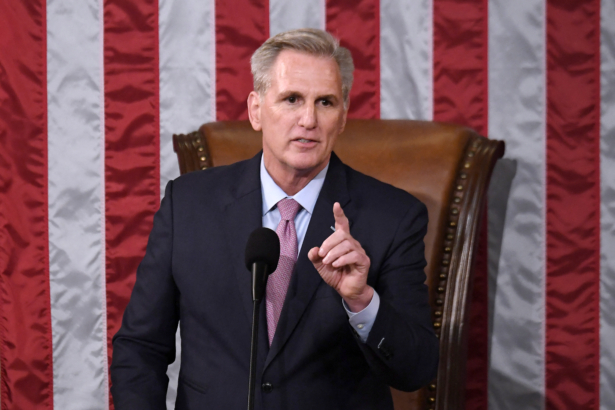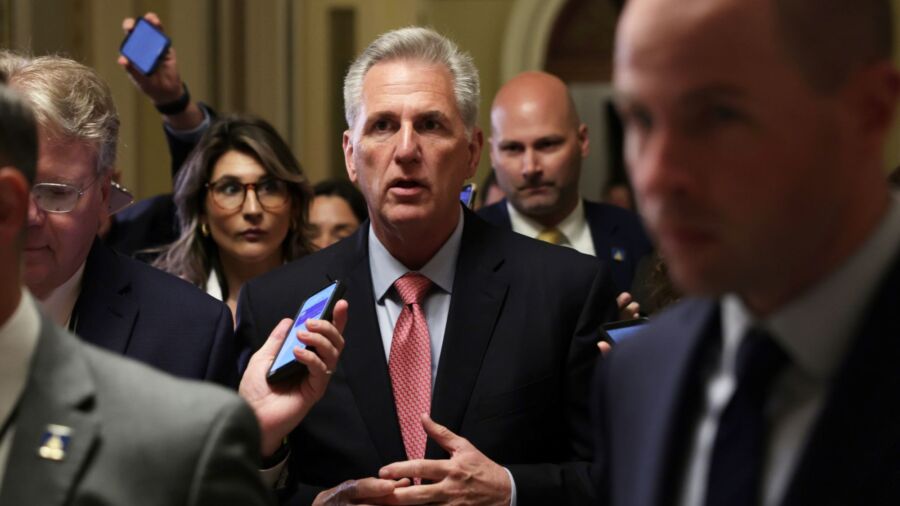The Republican debt ceiling and spending plan was approved by the House Rules Committee in the early morning hours of April 26 along party lines, clearing the way for a rapid up-or-down vote by the full House.
After a six-hour debate on H.R. 2811, the Limit, Save, and Grow Act of 2023, the committee recessed for several hours while Republicans held a strategy session. Upon reconvening, the Republican majority offered an amendment to strike the repeal of an ethanol tax credit from the bill.
Republicans rejected all amendments offered by Democrats, including one to remove expanded work requirements for SNAP recipients and others to remove cuts to the Meals on Wheels food program, the State Opioid Response Program, the Department of Veterans Affairs, and the Indian Health Service.
Democrats, who had decried spending cuts to various aid programs required by the bill during the debate, expressed outrage at Republican tactics.
“We heard all day that Democrats are the problem. And yet, we are here at nearly 2 a.m., not because Republicans were negotiating with Democrats but because Republicans were negotiating with themselves,” said Ranking Member Jim McGovern (D-Mass.).
“Maybe if this bill had a hearing, maybe if it had a markup, maybe if it wasn’t changed in the middle of the night, even though the GOP leadership swore it wouldn’t be changed at all, maybe we wouldn’t be in this position,” McGovern said. “This is not the way to legislate.”
Forcing Negotiation
Though experts say the bill has little chance of passing the Senate, Republicans hope its adoption by the House will force President Joe Biden to negotiate on federal spending, which he has so far refused to do.
If adopted, the measure would raise the nation’s $31.4 trillion debt ceiling by $1.5 trillion, temporarily relieving anxiety about the prospect of a default on the nation’s financial obligations. The increase would expire on March 31, 2024, requiring another vote in less than 12 months.
The bill would also reduce discretionary spending to the 2022 level, limit future spending, reinstate work requirements for some recipients of SNAP and Medicaid, rescind green energy tax cuts, and reduce bureaucratic obstacles to domestic energy production.
Fiscal Responsibility
Republicans portrayed the measures as a commonsense response to a financial crisis brought on by wild overspending by Democrats.
“Spending, spending, and more spending has been the theme of the Biden presidency. We’re already facing the ramifications of this spending spree,” Chairman Tom Cole (R-Okla.) said.

“If we keep squandering money the way we have been, all we will leave behind for our children and our grandchildren is a mountain of debt, a broken economy, and a destroyed national currency.”
Rep. Jodey Arrington (R-Texas), chair of the House Budget Committee, portrayed the nation’s fiscal health in equally graphic terms.
“Nobody can look at our balance sheet, nobody can look at the CBO budget outlook, and not shudder at the rapid deterioration of our nation’s fiscal health. As chairman of the Budget Committee, I can’t stress enough to the American people what a financial mess we are in,” Arrington said.
The country will pay more for interest on the national debt than for national defense within seven years, possibly as soon as 2025 depending on interest rates, according to Arrington.
“The American people are calling on Congress and the White House to address this fiscal insanity and figure out some way to come to a common ground” said Rep. Jason Smith (R-Mo.), chair of the House Ways and Means Committee.
An analysis by the nonpartisan Congressional Budget Office shows that the Republican plan would reduce federal budget deficits by $4.8 trillion over 10 years if enacted.
Unfair Cuts
Democrats responded by saying that deficit spending has been reduced under Biden and that the Republican plan was an attempt to balance the budget on the backs of the poor while shielding the wealthy from paying their fair share of taxes.
Alluding to the cuts to government services that would likely be required under the bill, McGovern said, “Some of the stuff that’s in here, quite frankly, is just plain mean.”
“Republicans tell us that they don’t need to pay for tax cuts for billionaires. But when it’s programs that help regular people, we need to cut, cut, cut,” McGovern said.
Though the bill does not list specific programmatic cuts, Democrats claim it would require a 22 percent reduction in all non-defense discretionary spending, including for many popular programs.

“The bill before us takes food off of people’s plates, tells them they cannot go to school any longer, denies them health care, and takes away their homes,” said Rep. Rosa DeLauro (D-Conn.), ranking member of the House Appropriations Committee.
“It would kick 300,000 children out of childcare and Head Start. It would slash nutrition services for more than 1 million seniors, and it increases heating and cooling costs for about 5 million households, makes college more expensive by taking away the opportunity for 80,000 people to attend college, and reducing the maximum award by nearly $1,000 for the 6.6 million students who receive Pell grants,” DeLauro said.
Arrington dismissed such predictions as “predictable rhetoric.”
“There is a lot of waste, there is a lot of woke, and there is a lot of bloat in this government,” Arrington said. “And we don’t have to impede or disrupt any funding for the folks that you are listing.”
Arrington listed cost-saving provisions of the plan. Those include eliminating Biden’s student loan forgiveness plan of $500 billion, reclaiming unspent COVID-19 relief funds of $60 billion, rescinding $70 billion in funding for 87,000 additional IRS employees, repealing green energy tax credits of about $1.2 trillion, and reinstating work requirements for some SNAP and Medicaid recipients.
“The CBO said we’d be spending $330 billion less than we’re spending today in 20 years,” Arrington said.
Working for Votes
While the Rules Committee debated the bill, House Speaker Kevin McCarthy (R-Calif.) and his leadership team met with Republicans holdouts.
Though the speaker declined to say whether he had the votes needed for passage, Rep. Kevin Hern (R-Okla.), chair of the 175-member Republican Study Committee, one of the more conservative GOP caucuses, said he thought the bill would pass.
“Speaker McCarthy will have meetings until the last minute, and he will do what’s needed to get it passed,” Hern told Reuters. “He certainly understands how to negotiate with members, as every speaker does.”

Yet with a majority of only 222 seats to the Democrats’ 213, McCarthy can afford to lose few votes from his own party.
That could explain the late-night amendment to preserve the ethanol tax credit while the repeal of other green energy tax credits remain in the bill.
At least 10 Republicans are reportedly leaning against the bill because it eliminates ethanol tax credits. The credits are a boon to farmers in the Corn Belt, which includes Republican strongholds like Indiana, Iowa, Nebraska, and Kansas.
Some other Republicans believe the proposed spending cuts don’t go far enough.
is a no-vote on the bill in its current form. Biggs wants to see more aggressive action on cutting spending even below the 2022 level, which the bill stipulates.
“With Biden’s additional spending that he’s wanting, you’ll have a $52 trillion national debt in 10 years. The Republican plan will give you a $47.5 to $48 trillion national debt. The problem is just the speed that you’re going off the cliff,” Rep. Andy Biggs (R-Ariz.) told NTD, sister media to The Epoch Times. “You’ve got to bring down spending.”
Biggs said he is leaning toward voting against the bill.
“At this moment, I’m a no,” Rep. Nancy Mace (R-S.C.) said in an interview. “We’re just putting our children and grandchildren in a more dire economic situation by not addressing the spending issues that we have today.”
Mace also said she is concerned about the repeal of green energy tax credits, which could impact the solar industry in her state.
A Test of McCarthy’s Leadership
The Limit, Save, Grow Act is shaping up as a test of McCarthy’s leadership as speaker, some experts believe.
The last prolonged negotiation over the debt ceiling, in 2011, resulted in a downgrade of the U.S. credit rating, which rattled financial markets and increased interest rates.

The x-date, meaning the date when the government will default on payments if the debt ceiling is not raised, is currently unknown. The Congressional Budget Office previously estimated that the date would come sometime in late summer.
However, Rep. Gwen Moore (D-Wis.) reported to the committee that tax receipts so far this year were below expectations. That could bring the x-date closer than first expected.
“The highest risk scenario is: they don’t have the votes this week, the deadline is before June 15 and now we’re really looking at a month to get things done. That’s the scenario that introduces the greatest amount of risk into the equation,” said Rohit Kumar, co-leader of PwC’s national tax office in Washington.
“If they fail, if they can’t pass something, then it clearly emboldens the Biden administration’s perspective of no negotiation, send us a clean debt limit increase.”
Reuters and The Associated Press contributed to this report.
From The Epoch Times

